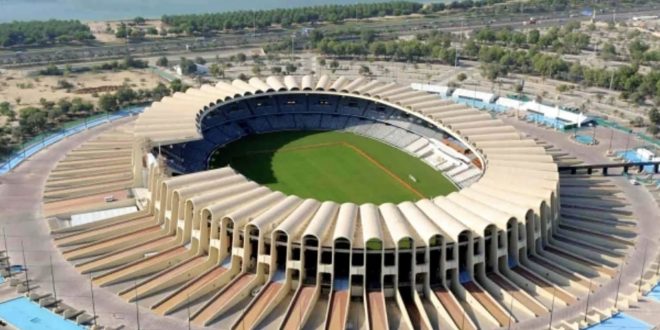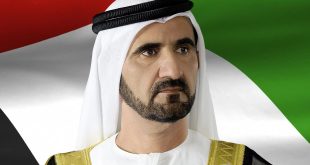Home to world-class facilities for all sorts of sports, the UAE has established itself as a global hub for hosting and organising major international sporting events.
These facilities are the cornerstone of the UAE’s leading position in the sporting field, as they enabled the sector to grow and prosper over the past 50 years.
The UAE’s dedicated efforts to construct top-flight sports facilities underscores the leadership’s belief in the importance of the sports sector and its influential role in boosting the UAE’s soft power. The country has hosted several regional and international events with high levels of professionalism, which were recognised by many international sports organisations, including FIFA, the Special Olympics, and Formula 1 racing, as well as regional and international federations of judo, jiu-jitsu, fencing, karate, rugby, weightlifting and equestrians.
Located in the capital, Abu Dhabi’s Zayed Sports City, one of the country’s leading sports facilities, was officially inaugurated in 1982, in conjunction with the 6th Arabian Gulf Cup.
Stretching across a total of 12 million square feet, Zayed Sports City comprises a large football stadium that can accommodate 43,000 spectators; a 6,000 square metre ice rink; a branch of the General Authority of Sports (GAS); a branch of the UAE Football Association (UAEFA); and a tennis complex with a main court accommodating 5,000 spectators and four surrounding training courts. It also contains more than six football training pitches, the Khalifa International Bowling Hall and a multi-purpose jiu-jitsu arena.
The UAE boasts over 16 football stadiums designed in line with FIFA standards, enabling it to host major sporting events, such as the FIFA U-20 World Cup, the FIFA Club World Cup, the FIFA U-17 World Cup, and the AFC Asian Cups of 1996 and 2019. These stadiums include Zayed Sports City Stadium, Mohamed bin Zayed Stadium, Hazza bin Zayed Stadium, Al Nahyan Stadium, Al Shamkha Stadium and Khalifa bin Zayed Stadium in Abu Dhabi, as well as Al Maktoum Stadium, Rashid Stadium, Zabeel Stadium, Maktoum bin Rashid Stadium, Al Aweer Stadium and Hamdan bin Rashid Stadium in Dubai, and many others in Sharjah, Ajman, Khorfakkan, Ras Al Khaimah and Fujairah.
On the architectural value of some of these stadiums, the Mohamed bin Zayed Stadium in Abu Dhabi is a distinguished architectural landmark in the UAE and the entire region, as it has a unique design and several floors, in addition to featuring a smart design for its spectator seats. The stadium, which was inaugurated in 1980 and constructed over two phases in 2006 and 2009, can accommodate 42,000 spectators.
The Hazza bin Zayed Stadium, which was inaugurated in 2014 and covers an area of 45,000-square feet, is one of the most advanced sports projects in the Middle East. It accommodates 25,000 seats distributed over seven levels, including 3,000 VIP seats.
The Al Maktoum Stadium in Dubai was re-inaugurated in 2019 at a cost of AED200 million, to become an outstanding architectural masterpiece equipped with the latest lighting and security technologies. The stadium was built in line with European stadium specifications.
The Yas Marina Arena in Abu Dhabi is one of the world’s major Formula 1 racing tracks and has witnessed several developments after hosting its first Formula 1 race in 2009.
Meydan City in Dubai, which has the largest horse racing track in the world, was inaugurated in 2010 and hosts the annual Dubai World Cup.
The track, along with its connected hotel, is a unique international architectural landmark, as it contains the largest connected building in the world with a length of more than 1.5 miles, as well as stands accommodating 82,000 spectators, a racing track with a 6.1-kilometre straight, and a five-star hotel with 285 suites and rooms, a horse racing museum, exhibition halls, and golf and tennis courts.
The Hamdan Sports Complex, which was inaugurated on 10th October, 2010, in Dubai is a great addition to the country’s sports facilities, as it has hosted many local and international tournaments over the last ten years totalling 94 global events, 238 local events and 18 non-sporting events. The complex held 59 international water sports events, and those held in the last five years witnessed an increase of 41 percent. In 2019, 65 events were held in the complex, including 13 global events and 52 local events.
The complex hosts competitions for over ten other Olympic sports, accommodating 15,000 spectators. It also has three main swimming pools and has received three ISO certificates in management, safety systems, occupational health and environmental management systems.
The Dubai Sports City, inaugurated in 2004, occupies a distinguished position among the country’s sporting facilities and has witnessed gradual development. It covers an area of 50-million square feet and feature hotels and various sports facilities. It also hosts the International Cricket Council, a cricket field, and other fields for rugby and hockey, and a gym, an Olympic swimming pool and several entertainment facilities overlooking the football courts.
In 2013, the Dubai Cycling Track was constructed in Seeh Al Salam and Al Qudra Street according to the highest international safety and security standards. It includes two paths, with the first being 49 kilometres long while the second is 10 kilometres.
Zayed Complex in Fujairah is a modern national sports facility. Its foundation stone was laid in October 2014 and it was constructed over several phases. It has an ideal location to host major sporting events, covers an area of 178,300-square metres, accommodates 2,500 spectators, and has a VIP section and several stadiums and restaurants.
 UAE BARQ برق الإمارات – نبضك
UAE BARQ برق الإمارات – نبضك


